| Reviews & Columns |
|
Reviews DVD TV on DVD Blu-ray 4K UHD International DVDs In Theaters Reviews by Studio Video Games Features Collector Series DVDs Easter Egg Database Interviews DVD Talk Radio Feature Articles Columns Anime Talk DVD Savant Horror DVDs The M.O.D. Squad Art House HD Talk Silent DVD
|
DVD Talk Forum |
|
|
| Resources |
|
DVD Price Search Customer Service #'s RCE Info Links |
|
Columns
|
|
|
Manson, My Name Is Evil
Exploitation with some intriguing ideas (and not a few laughs)...even if its targets are easy and scattershot. Lionsgate has released Manson, My Name is Evil, a title you apparently can now find on IMDB (they changed it), which is a marketing rebranding of Leslie, My Name is Evil, a 2009 Canadian indie from writer/director Reginald Harkema (don't be fooled by the title change: Manson is a supporting player here). Described elsewhere as "loosely based" on the infamous Charles Manson-directed Tate/LaBianca killings of 1969, and specifically on Leslie Van Houten's involvement in those heinous murders, Manson, My Name is Evil takes that basic historical framework and weaves in a fictitious subplot about a conflicted Christian youth who becomes a member of the Manson jury, while the film attempts to link collective national, sociological, and psychological guilt for U.S. involvement in Vietnam (specifically, the My Lai massacre), with the final products of Manson family rampages: robotic killers and lots of dead bodies. It's a heady combination for what's essentially a balls-out exploitation satire, and it's never uninteresting, so maybe that's enough...even if all of this is old-hat.
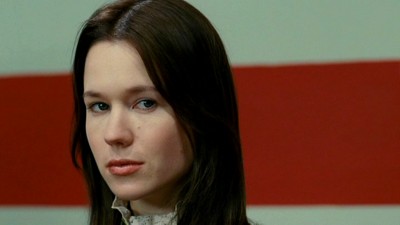
According to Manson, My Name is Evil, hippie Leslie (Kristen Hager) is prime fodder for a satanic death cult like Charlie's (Ryan Robbins) "Family." Raised a "good" girl in an outwardly happy, affluent home, Leslie suffers in silence as her parents fight and eventually separate, and as she goes from cheerleader and homecoming queen to knocked-up flower child who's "forced" to have an abortion by her emotionally-distant mother (Tracy Wright). Having had enough of both her mother's bitterness and constant, mindless TV-watching (which is filled with the violence of the day, including JFK's assassination and the increasing horrors of Vietnam), Leslie escapes to beautiful, hedonistic pleasure on the California beach with dark, handsome Bobby (Travis Milne). Unfortunately, in-love Leslie discovers all-too-soon that even in these pre-Lifetime days, liberated hippie-men could practice "free love," as well. So as Bobby casually helps himself to another passing girl, he passes a hurt, bewildered Leslie on to Charlie, a whacked-out, scary ex-con with a Messiah complex who "turns out" Leslie through a combination of sex and a seriously-warped "Power of Negative Thinking" line of b.s..
Contrast Leslie's unhappy maturation from cheerleader to blithe thrill-killer, with clean-cut teen Perry (Gregory Smith). Following his father's (Peter Keleghan), God's, his church's and his country's advice (in that order), Perry has successfully navigated post-WII America to become an upstanding, god-fearing member of society. Blessed with skills in chemistry, Perry will score a job with the Star-Spangled Chemical company, which has a "special" relationship with the government, producing materiel necessary for the war effort (and thus providing Perry with that all-important draft deferment), while he scores a fiancé in Dorothy (Kristin Adams), a rigid, righteous Jesus-freak who only lets Perry get "under the sweater" after he scores that deferment and promises marriage. Perry may be disquieted by the images on TV of the slaughter happening in Vietnam (his Dad chortles admiringly at them), but he's towing the party line laid out for him by Dad and Dorothy--mostly in a vain effort to get something, anything from Dorothy prior to marriage. Nothing can prepare him, though, for the sock-in-the-gut impact of seeing the ridiculously hot hippie murderess Leslie sitting in the dock, coyly smiling at him, as Perry suddenly questions all the tenets he previously held sacred in his life.
SPOILERS ALERT!
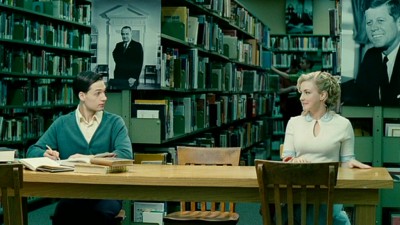

Depending on your political and religious outlooks, as well as what mood you may happen to be in when watching it (I had just had a nice meal, so...), you can take Manson, My Name is Evil about any way you want. You can be offended by it; you can laugh with it, or at it, you can question its suspicious motives, or you might ponder a few of the familiar yet under-developed connections that writer/director Harkema makes between Manson's killings and the societal system that allowed Vietnam to happen. Harkema certainly seems to be trying to say something serious amid all the overblown and admittedly funny satire. What exactly those "serious" issues or themes are becomes harder to define as Manson, My Name is Evil goes along, because attempts to connect those threads aren't attempted, and sensory overload and subliminal suggestion takes over. And that's fine if you just want a viewer to groove along with the nudity and violence...as long as you don't mind different audiences all wondering what the hell you're trying to get at.
Since most of Manson, My Name is Evil is pitched in an obvious, even grotesquely satirical, farcical tone, it's dangerous to take too many of its generalized condemnations as representational--even if that's what the writer/director believes to be true about American society. While Harkema's deliciously cartoony depiction of Perry's rigid American Christian household seems to now hold favor with many writers and pundits who frequently take such caricatures as a "true" depiction of the average American household of that time (and today's), that's of course nonsense to anyone who grew up then (and that's coming from a "non-believer" reviewer)--just as making the generalization that all "hippie" kids were drug-addled murderers would be equally ridiculous. These are extremes used to illustrate ideas (at least I would hope Harkema believes these two "families" to be extreme, isolated examples of the American experience), not nuanced, "realistic" depictions of unique, complex themes and dynamics. That being said...what ideas that are bandied about in frenetic fashion in Manson, My Name is Evil, aren't all that startlingly original, frankly, in terms of making connections between the murderous violence of Vietnam and Manson, or the smug scorn directed at the "typical" mainstream 1960s American family that represses Perry's religious, social and sexual growth. Those old saws have been worked over in countless media forms for decades now, and Harkema doesn't bring anything new to the table on them, dropping in visual allusions between Vietnam and the murders (along with Nixon and LBJ) with frequency--but without anything stronger than suggestion. Perhaps Harkema doesn't realize that he contradicts one of the central connections in his film when he has Perry defending Leslie to his dad, declaring she can't be guilty of premeditated murder if she's a mindless robot under the control of Charlie. If that's true, then how could anyone declare the soldiers of My Lai responsible for their horrific individual actions? Of course, we can and should have held the individuals responsible--along with the superiors who okayed the massacre, but Manson, My Name is Evil isn't interested in going beyond showing photographs of that infamous Vietnam massacre--an easy condemnation that may satisfy knee-jerk reactions, but which ignores the inconvenient heroism of the soldiers and airmen who didn't take part, who saved civilians, and of the majority of the American public, including all those square, religious "Perry families," who were shocked and disgusted by the event, and who increasingly turned against the war when the massacre became public. Nor does the film convince us that Leslie was so badly mistreated in her childhood that her cold-blooded, vicious stabbing of a complete innocent was in any way justified. Indeed, if one looks closely at Harkema's central premise of linking the two murderous events, it's a stretch, at best. Anyone taken aback by Harkema's observations and connections here must be coming new to these matters.
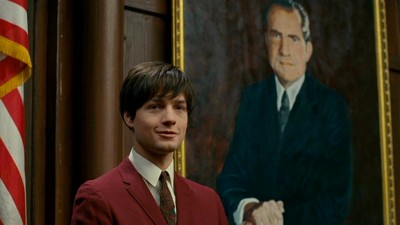
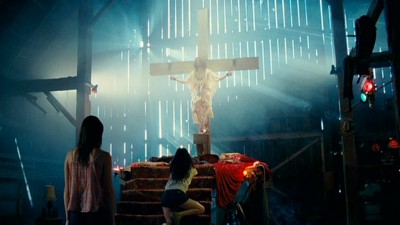
Familiarity of ideas, though, isn't a drawback when Harkema can visually smack the viewer's sensibilities (something he's far more successful at throughout the movie). The film's final image is the best example of his shock technique. We knew from the minute Perry interviews with the Star-Spangled Chemical company (read: Dow Chemical) that his efforts on behalf of the company will be--at the very least--ironic in terms of his pivotal role in deciding if Leslie is a murderer. But the truly horrific image of a charred Vietnamese woman (or is it...Dorothy?) holding the burnt husk of her baby, with smoke coming out of its eye sockets, is visceral to our senses (and importantly, our sensibilities) in a way that Harkema's obvious and crude satire is not. That's a shocking final image, and one that brings us up short after enjoying all of the admittedly funny sequences involving Perry's murderously militaristic/religious father, and Perry's growing sexual frustrations. Manson, My Name is Evil is filled with such sequences. It may be one-sided caricature, but anytime poor Perry is either dodging his father's entreaties to get into the game and enjoy Vietnam's slaughter ("God's will and mine are pretty much the same, so you better listen to me," is a classic), or begging the maddeningly closed-off Dorothy for sex, Manson, My Name is Evil is consistently amusing.
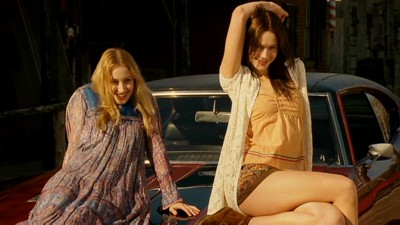
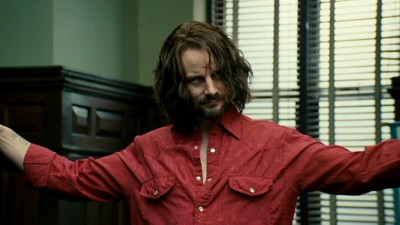
Harkema's take on Leslie and her initiation into Charlie's family is less successful (and more problematic) as satire, and more on-point as exploitation, with the gorgeous Kristen Hager (she reminded me at times of a young Barbara Seagull. I mean "Hershey") the very embodiment of that complicated (and naughtily distasteful) eroticism that enveloped "flowerchild-gone-wrong" stereotypes from the beginnings of that particular exploitation subgenre. Harkema knows exactly what he's doing when he shows the beautiful Hager dancing seductively to Charlie's and Bobby's dueling guitar-off, or when she's kicking up her legs, trying to strike the bailiffs as Perry jockeys in the jury box to get a better look at her panties (with Harkema helpfully giving us some close-ups, in the film's funniest sequence). All of this, of course, is totally sick and perverted when you remember that a real murderer is being used for this exercise in satire and outraged politics, factored in among the gratuitous nudity and violence, and I suppose one could fall back to that standard "go-to" film school canard about the director implicating the audience in their own twisted pleasures. But then...you have that final shot of the film, and the weirdness of kinda-enjoying a film featuring a true-life, reprehensible murderess, seems unimportant in the end.
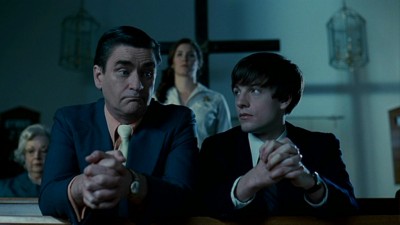
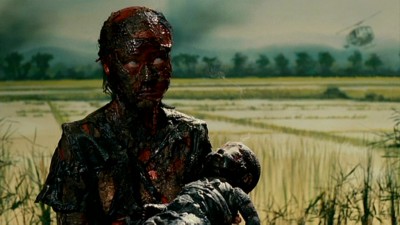
The DVD:
The Video:
The anamorphically-enhanced, 1.78:1 widescreen image for Manson, My Name is Evil looks extremely clean, with deep blacks and no compression issues. Excellent cinematography and art direction comes across in this sharp transfer.
The Audio:
The Dolby Digital English 5.1 stereo audio track has an expansive spread over the speakers, with nice separation effects and an emphatic recording level. Close-captions are available.
The Extras:
There are no extras for Manson, My Name is Evil.
Final Thoughts:
I'm not sure writer/director Reginald Harkema makes his case for connecting up national or personal guilt for the My Lai massacre and the Manson family killings, but Manson, My Name is Evil is funny and off-putting, and at least it's shooting for much more than just being a good-looking exploitation rip-off of the Manson murders. I'm highly recommending Manson, My Name is Evil.
Paul Mavis is an internationally published film and television historian, a member of the Online Film Critics Society, and the author of The Espionage Filmography.


|
| Popular Reviews |
| Sponsored Links |
|
|
| Sponsored Links |
|
|
| Release List | Reviews | Shop | Newsletter | Forum | DVD Giveaways | Blu-Ray | Advertise |
|
Copyright 2024 DVDTalk.com All Rights Reserved. Legal Info, Privacy Policy, Terms of Use,
Manage Preferences,
Your Privacy Choices | |||||||












